During my 4 month mission in Syria, my main impressions were of the courage, the self-esteem and the unshakeable faith of Syrian people in a country that has been hard hit by international sanctions, which make their daily lives worse than they were during the war.
I met ;
Warriors women, involved in their parish choirs, in charities, self-employed, often they are pillars of their families. These women, as well as managing their husbands and children, often work and are keen to maintain social links and take French lessons in the evenings in SOSCO’s cultural centers.
I met a cheerful, engaging, enthusiastic and curious young people who actively participate in the activities of scouting associations, enabling them to open up to others and develop through sport and the arts, putting their difficult situation on hold for a few hours.
I met courageous students who, alongside their studies, volunteer for SOS Chrétiens d’Orient, take French lessons and work to make up for the difficulties of economic life and the high cost of living.
Children whose faces light up when they are invited to draw or play.
Men who didn’t succumb to fate, who work to rebuild their shops, their houses, even their town, after the damage caused by the civil war or the earthquake of 2023.
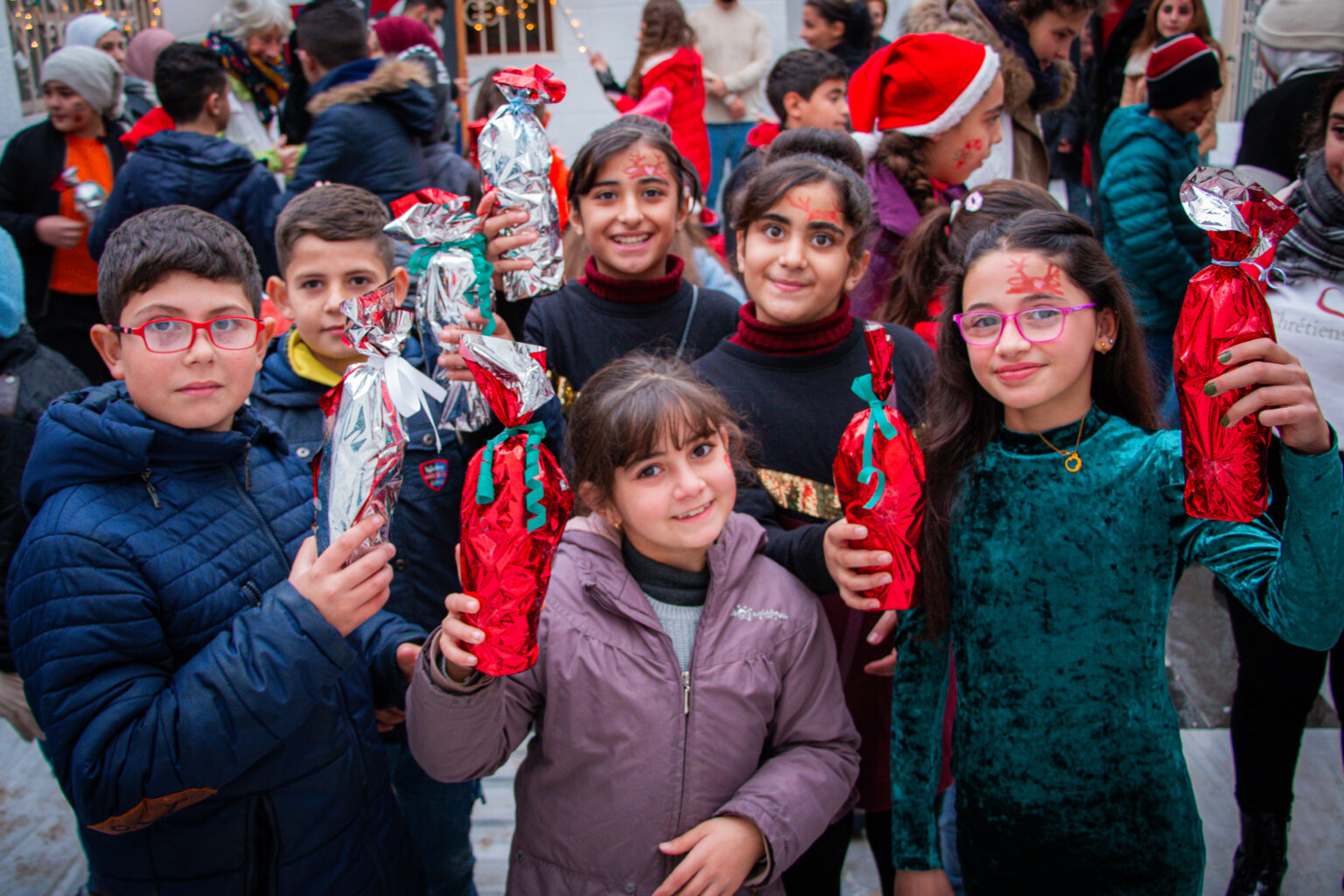
I discovered Eastern Christian rites in beautiful churches (many of which were destroyed during the war and have since been rebuilt) where the masses, whether in Syriac, Aramaic, Arabic or Armenian, were as sacred and moving as the faith and fervour of many faithful, often carried by the choirs magnificent songs. The Church of the East is the Church of Hope.
I was deeply touched by all the THANKS from people plunged into great destitution, to whom we brought either a presence, or concrete help through our regular visits, to make their daily lives better; often with tear-filled eyes, but with a broad smile lighting up their faces. And there was always a touch of Eastern hospitality: an invitation to share a cup of coffee that we sometimes couldn’t accept due to lack of time.
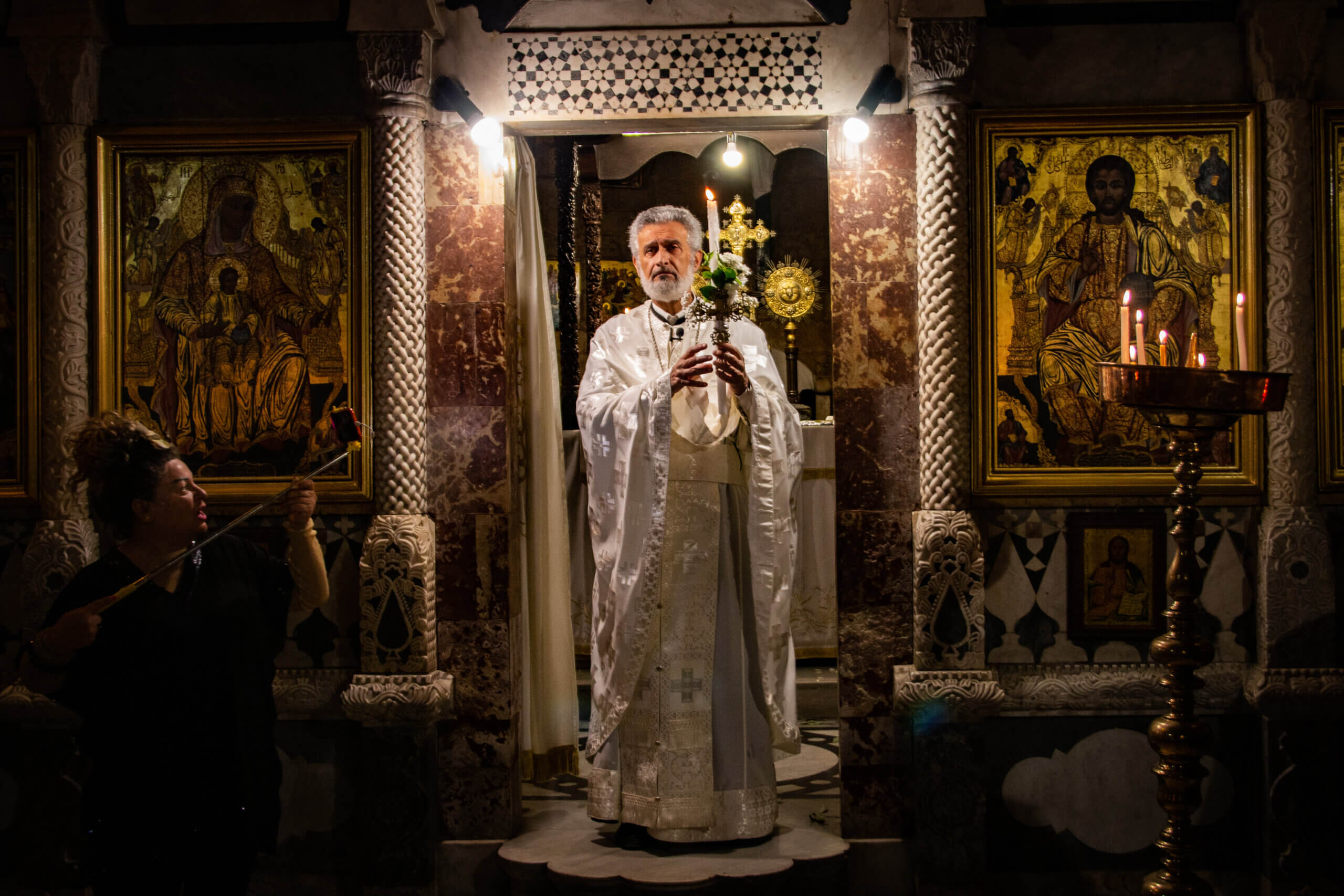
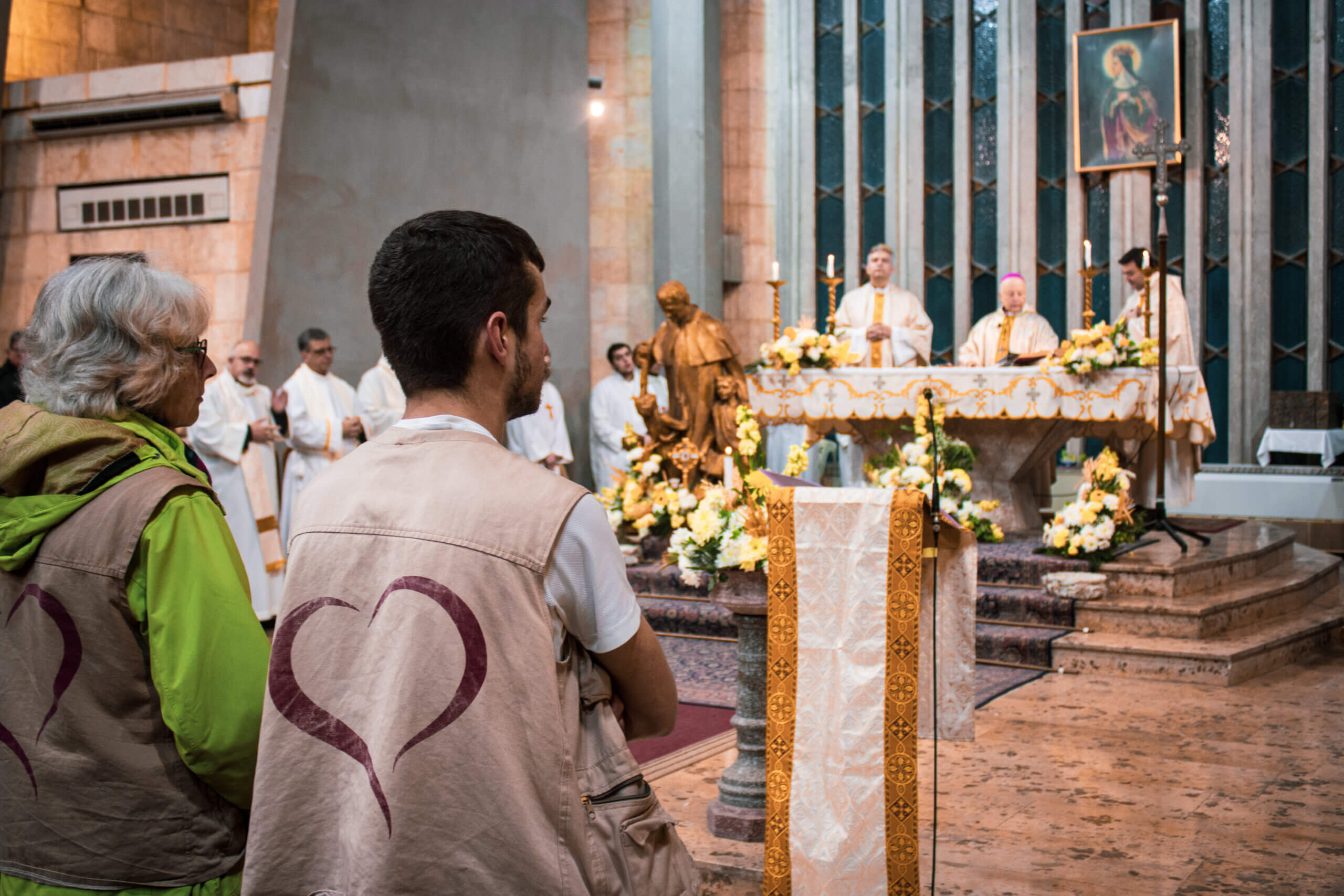
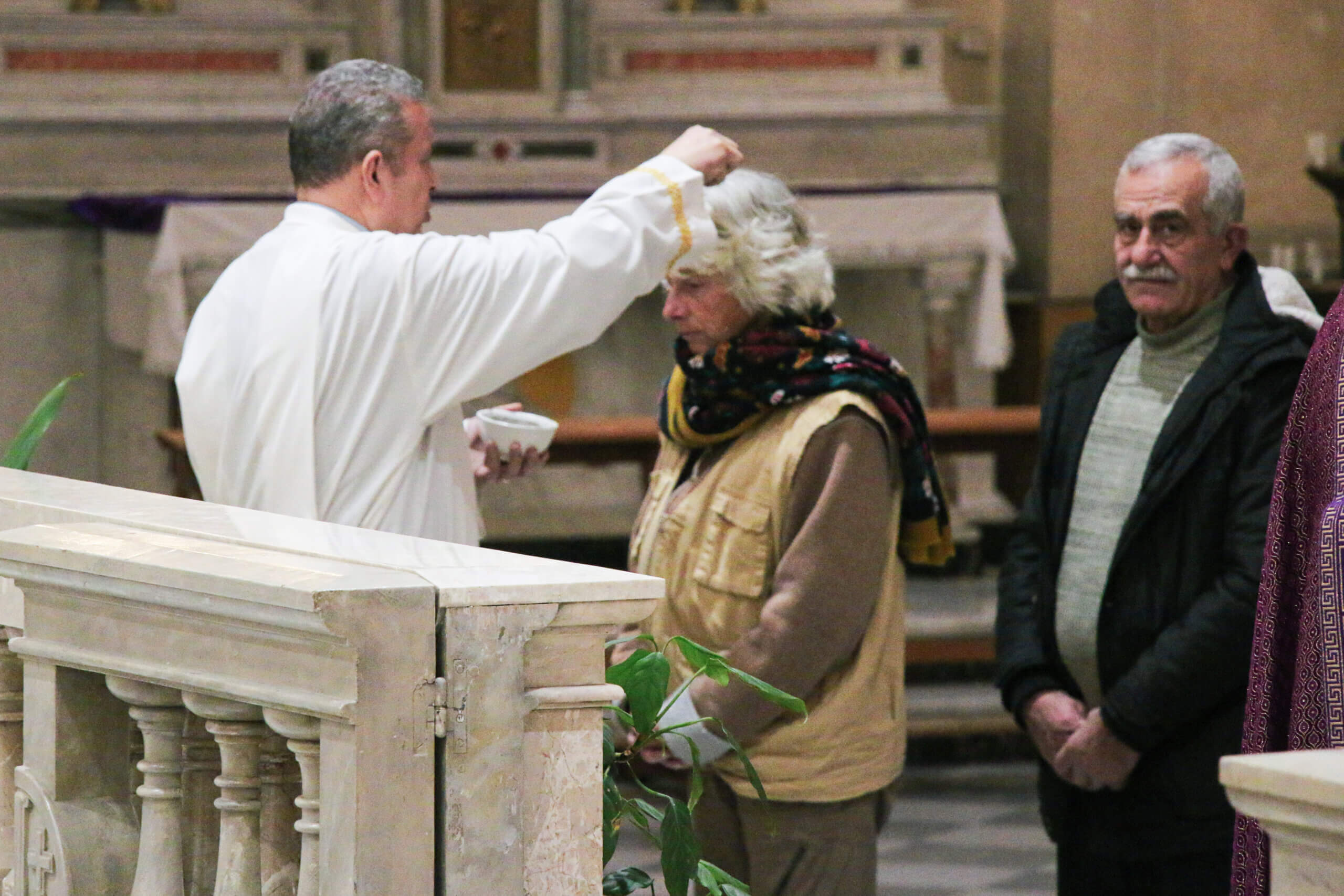
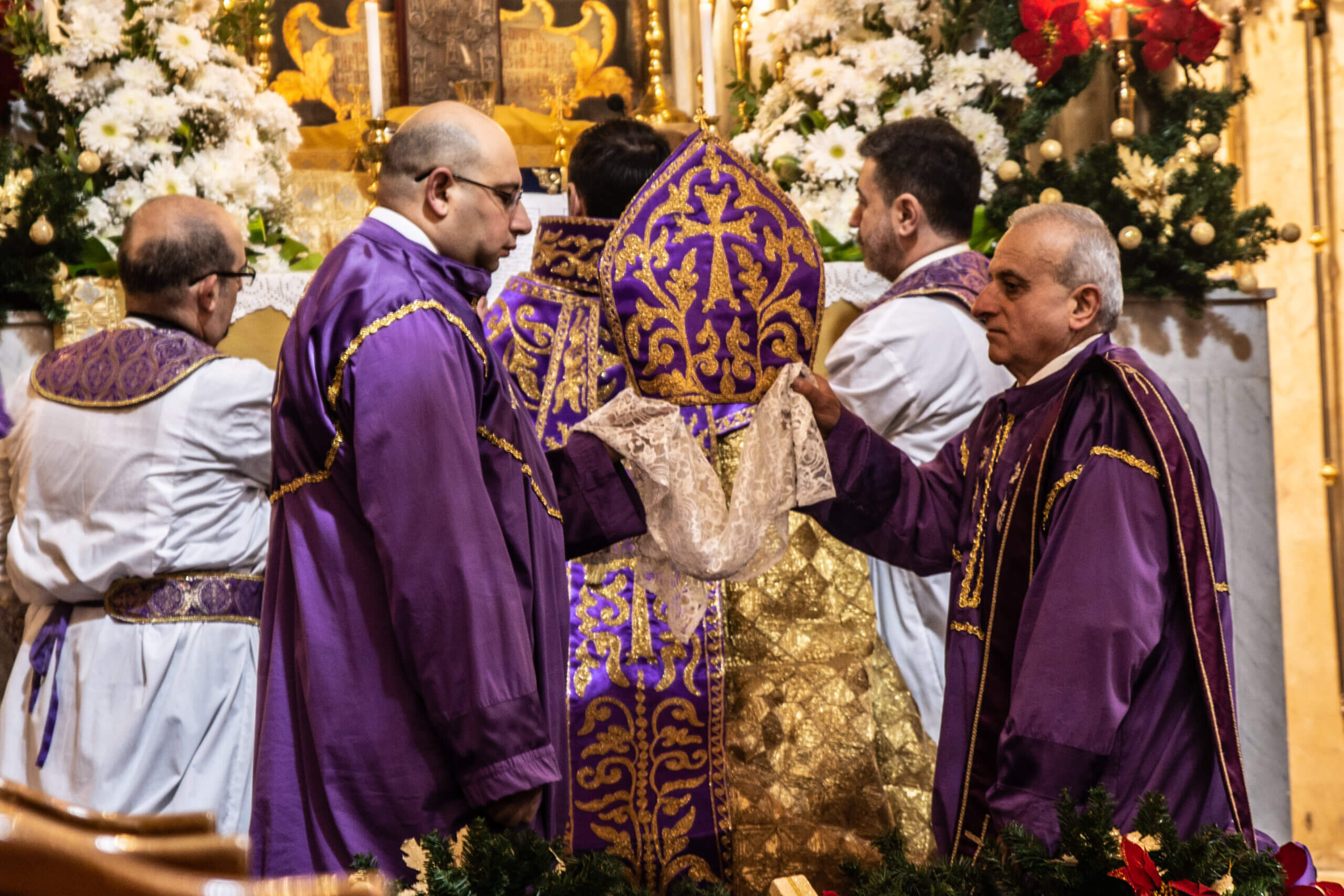
At the beginning of December, I arrived and stayed in Damascus for two weeks to get used to the team works pace. I was delighted to contribute to the hundreds of gift-wrapped pyjamas, dressing gowns, hats, scarves and sweatshirts that we distributed to elderly’s homes, an orphanage and the the children’s cancer department of a hospital for Christmas. What a joy it was for me, as a volunteer, to feel useful in this way and to be able to give a little warmth and comfort to these people. It’s important to remember that in Syria, since the war, the electricity supply has failed, meaning that not a single building, house or flat is properly heated. Winter can be very harsh in Syria.
I celebrated New Year’s Eve 2024 in Aleppo, where I stayed until the end of my mission. Along with Antoine, we had our hands full!
Several mornings a week, we went to the Franciscans’ center. A team of 25 person work in the kitchen, preparing hot meals for more than 800 people. Depending on the arrival of vegetables, I took part in peeling and cutting up hundreds of kilos of potatoes, cabbage, beetroot, carrots, chard, etc., or sorting mouloukhieh leaves or bourghoul grains in a very happy atmosphere among a group of women and men who joked, laughed and sang while doing their work efficiently.
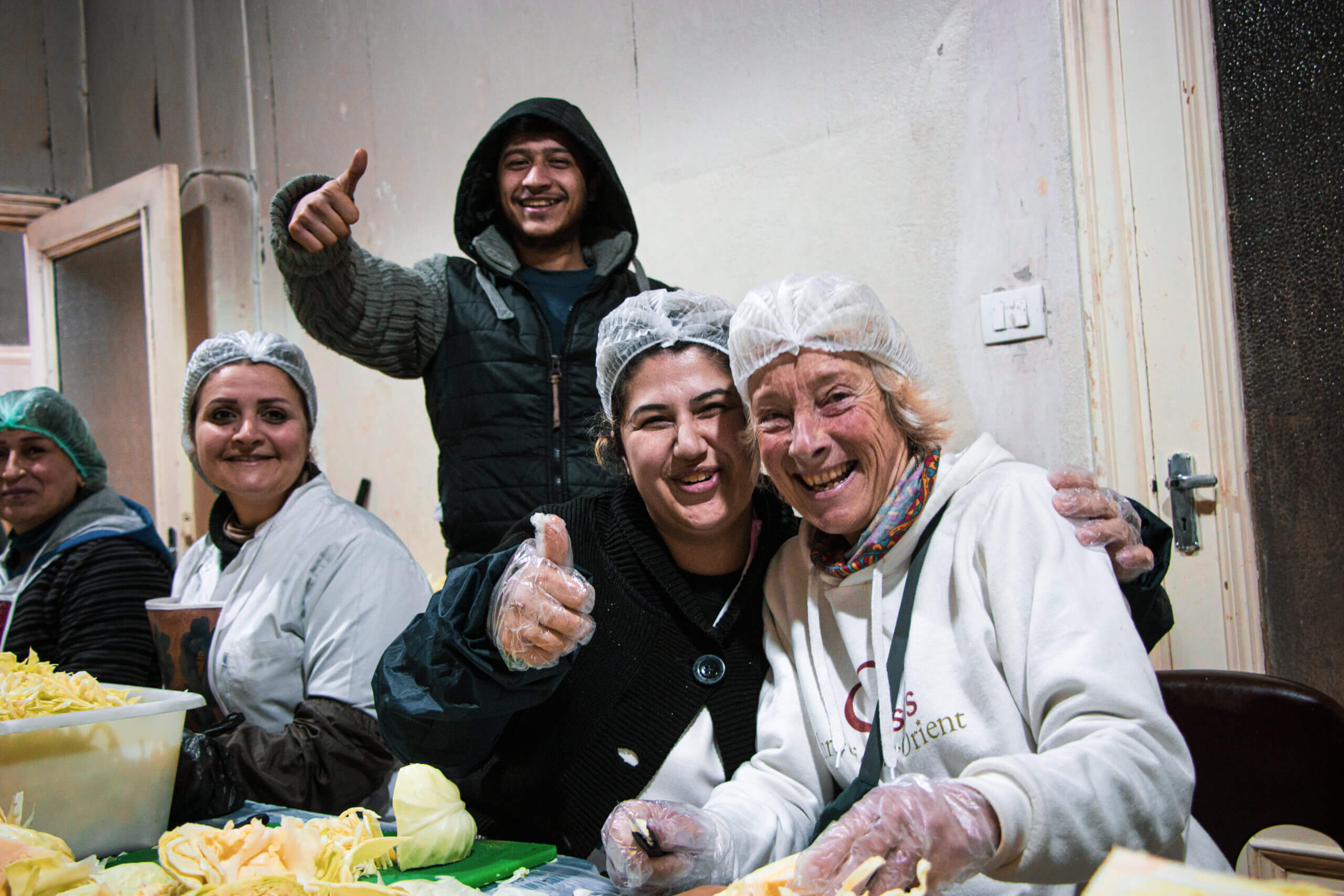
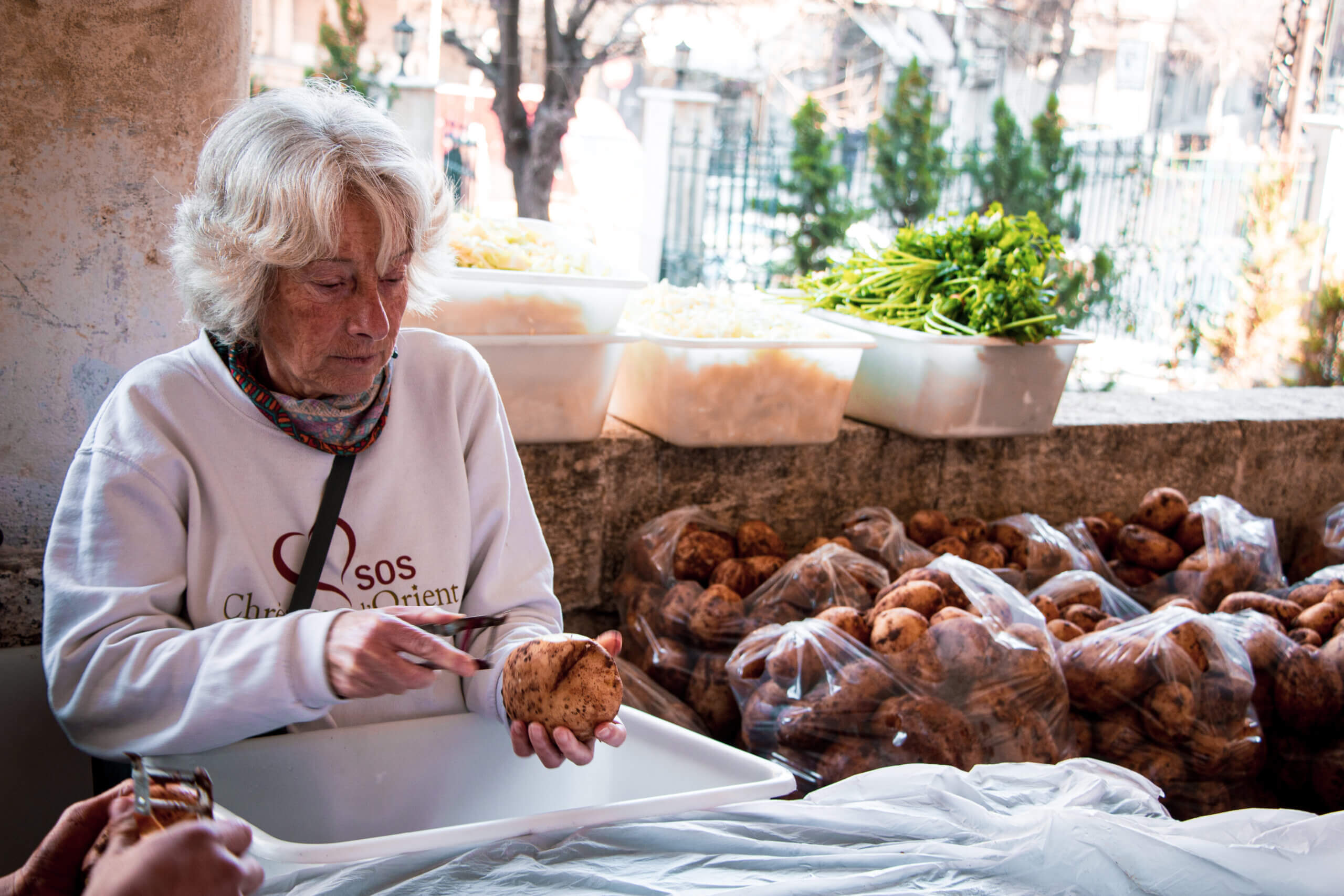
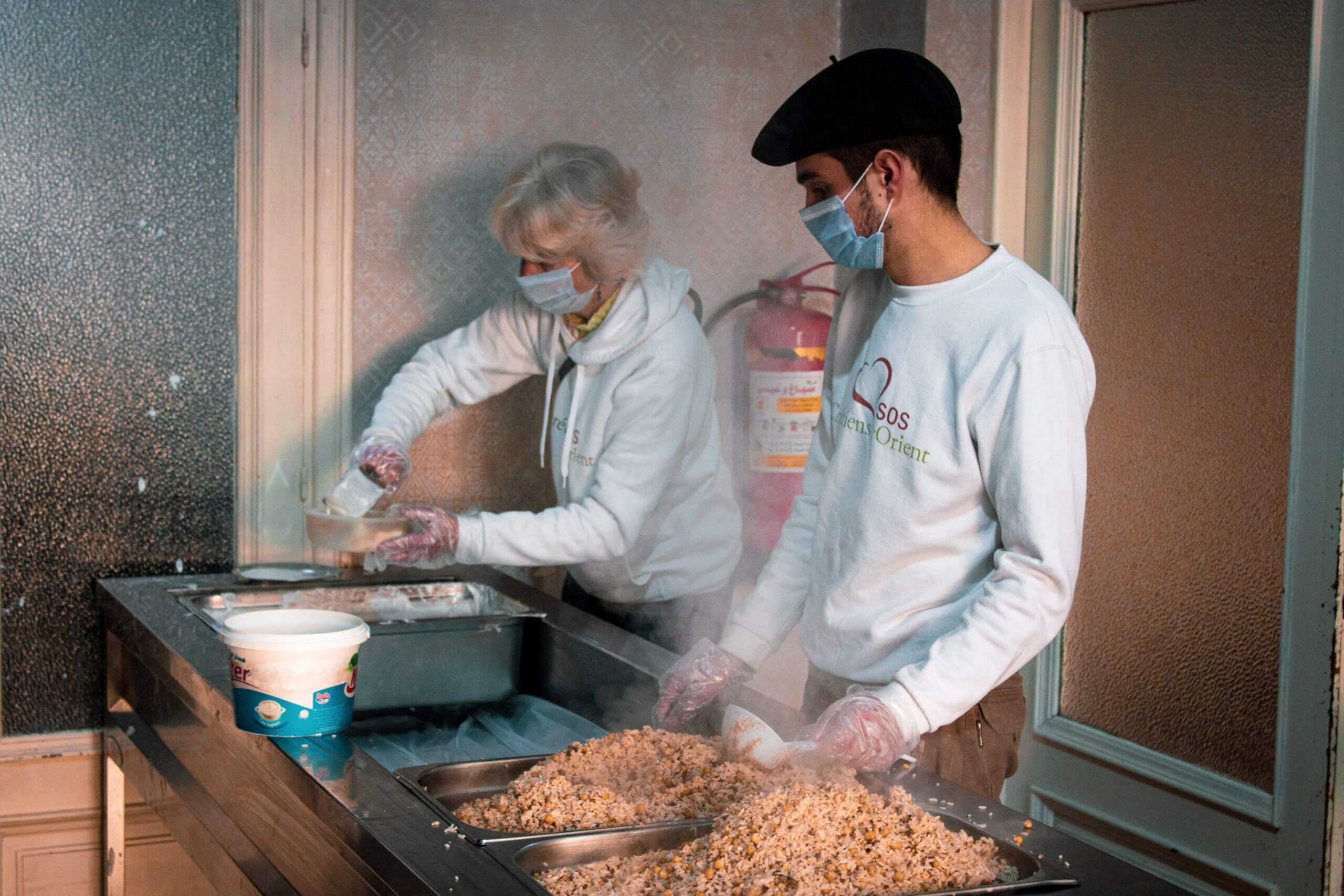
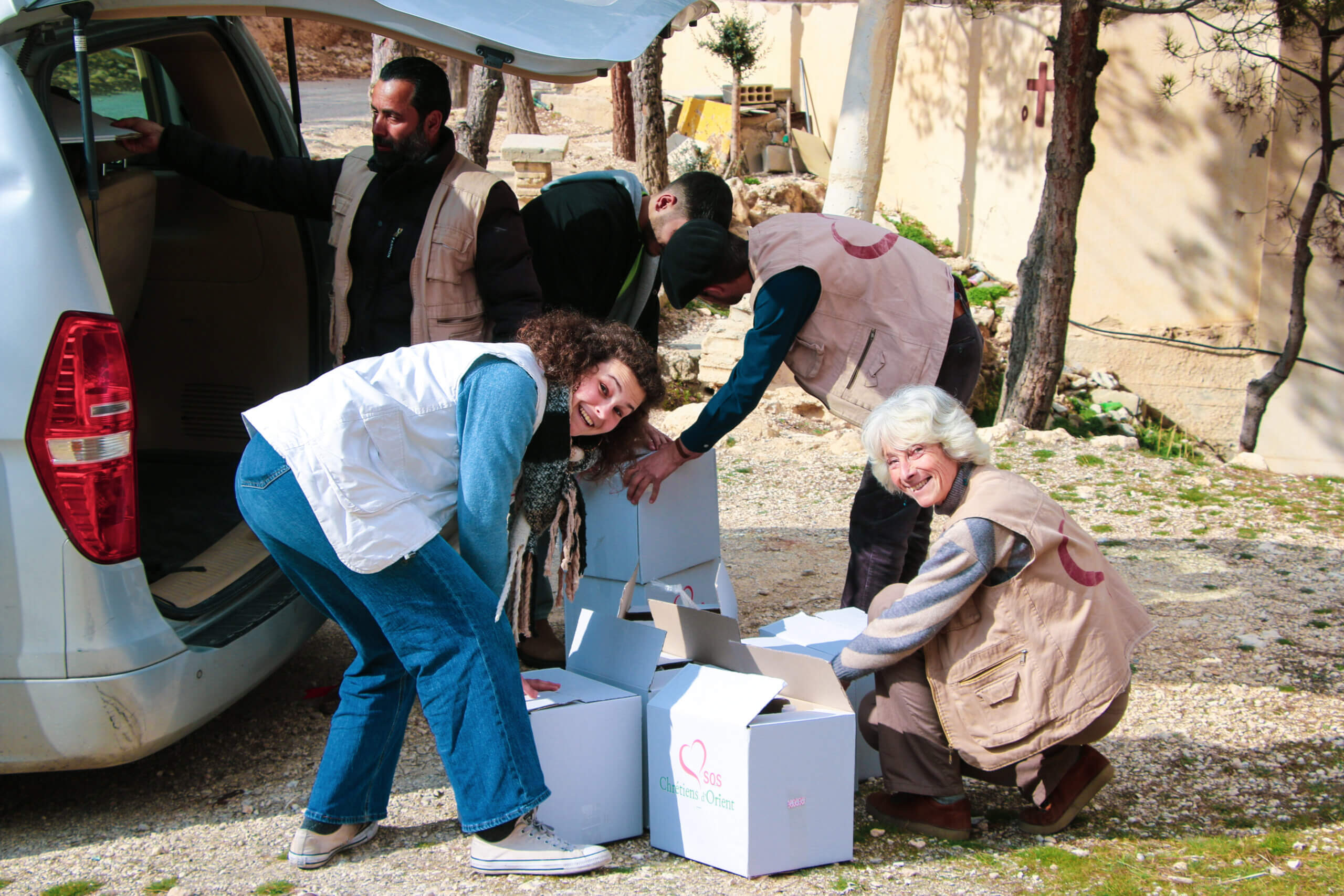
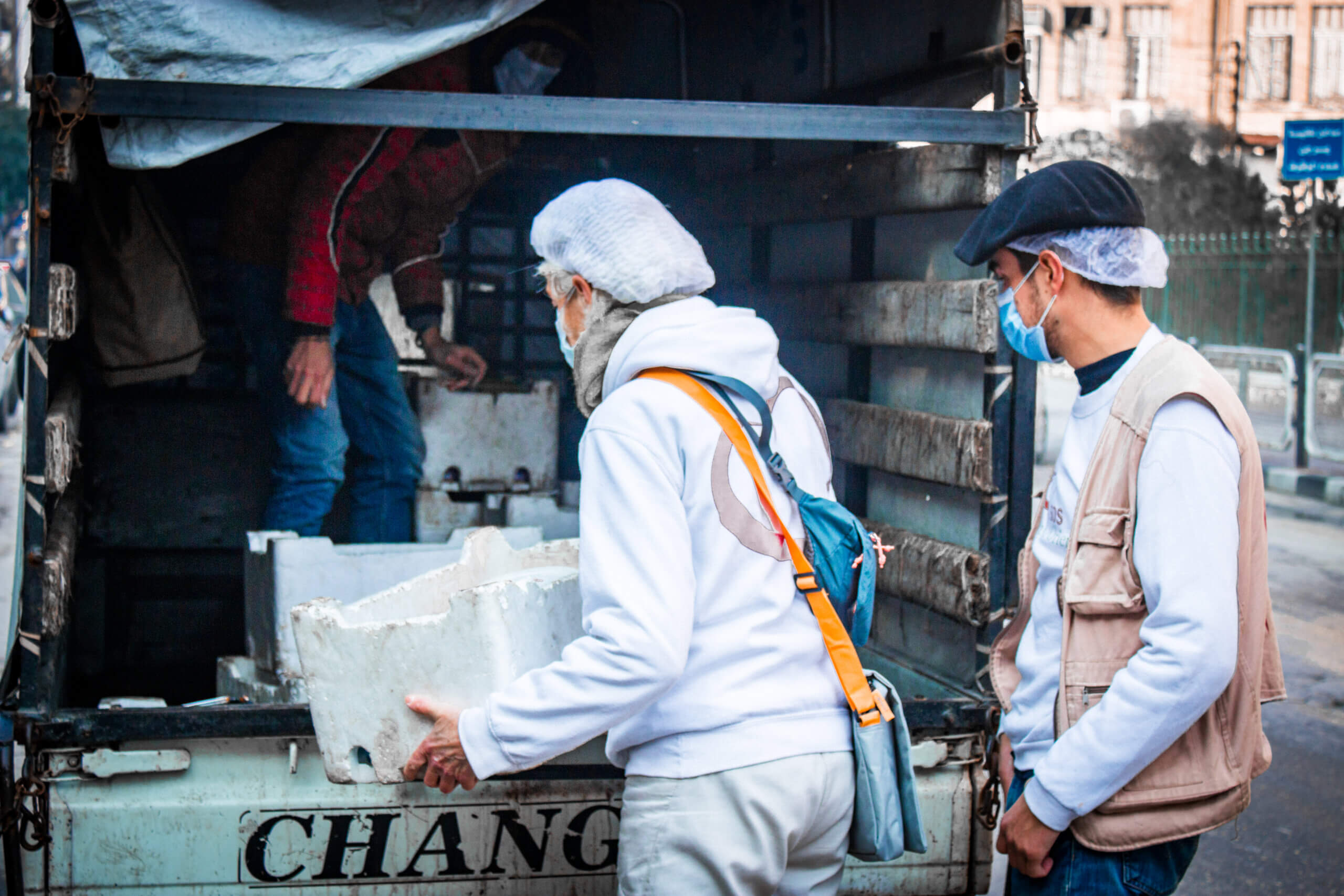
Taking part in activities with young Syrians was a great experience for me, because I soon realised that they too were curious and eager for contact. Whether it’s with the Salesians or the members of the FDJ (Fédération Des Jeunes, associated to the Armenian Church in Syria), they share the same thirst for social links and the transmission of values linked to scouting rules, such as listening, respect, discipline, sharing and faith, helps them to anchor themselves in reality and to have confidence in themselves.
As a result of the war and the earthquake, many families were broken up and many elderly people found themselves alone and isolated. By choice or by necessity, they have sold their homes and are now in retirement homes, reassured by the presence of competent staff in case of medical problems, but above all surrounded by other residents with whom they can chat and who, sometimes, happened to be their neighbours a few years earlier. Visiting them every week was a breath of fresh air for them, and I met some lovely grandparents who were delighted to tell me their memories and anecdotes about their family life in Aleppo. The time spent in their company always passed very quickly and we were always eagerly awaited.
The Armenian orphanage St. Gregory is also a weekly must-see. There too, as soon as you walk through the door, you hear nothing but cries of ‘ball please, cards, UNO, UNO! In small groups, boys and girls sit down on the floor and demand uninterrupted games of UNO or card games to build into castles.
Thanks to the SOS Chrétiens d’Orient Cultural Centre in Aleppo, which offers drawing, music and French courses, I was able to listen to talented young people playing the violin, oud, flute or kanoun.
Thanks to the kindness of Rita and Katia, I was able to meet and talk to young people and adults taking French courses, who were very curious and asked lots of questions about my presence here: What is a 63-year-old pensioner doing in Syria? Do I like Aleppo? Why? We exchanged tips on life in Aleppo and pastry shop addresses.
I also admired the talent of Houry, the drawing teacher, who makes the children do marvellous things in just one hour of lessons.
Of course I’ve made progress in Arabic, but not in the classical sense, because here we speak Syrian: A lot of the words are completely different, but Mona is an excellent teacher! Good year, bad year, I can tell the time and use the most common everyday verbs in short, useful sentences. I’d have to come back for 6 months to speak better.
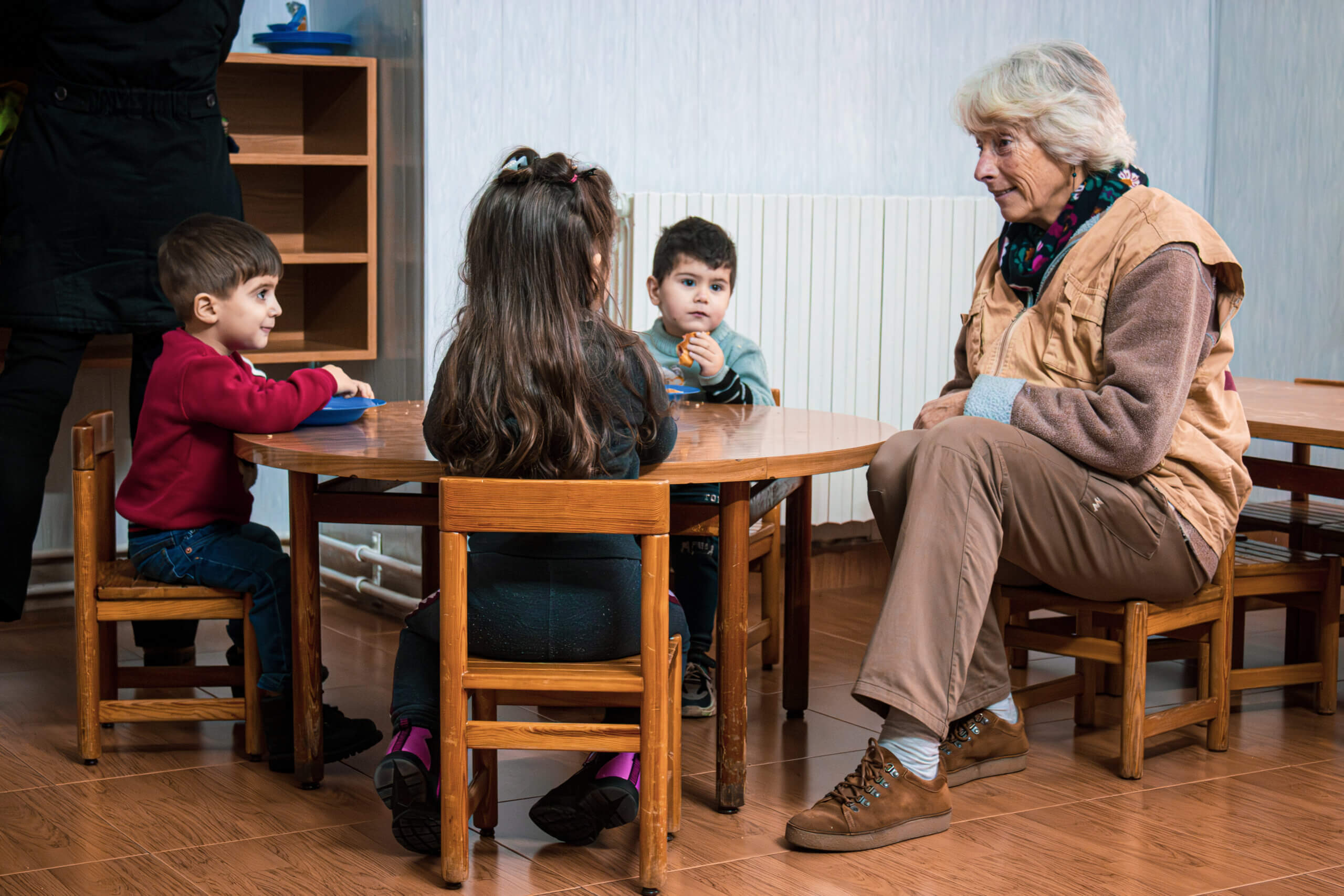
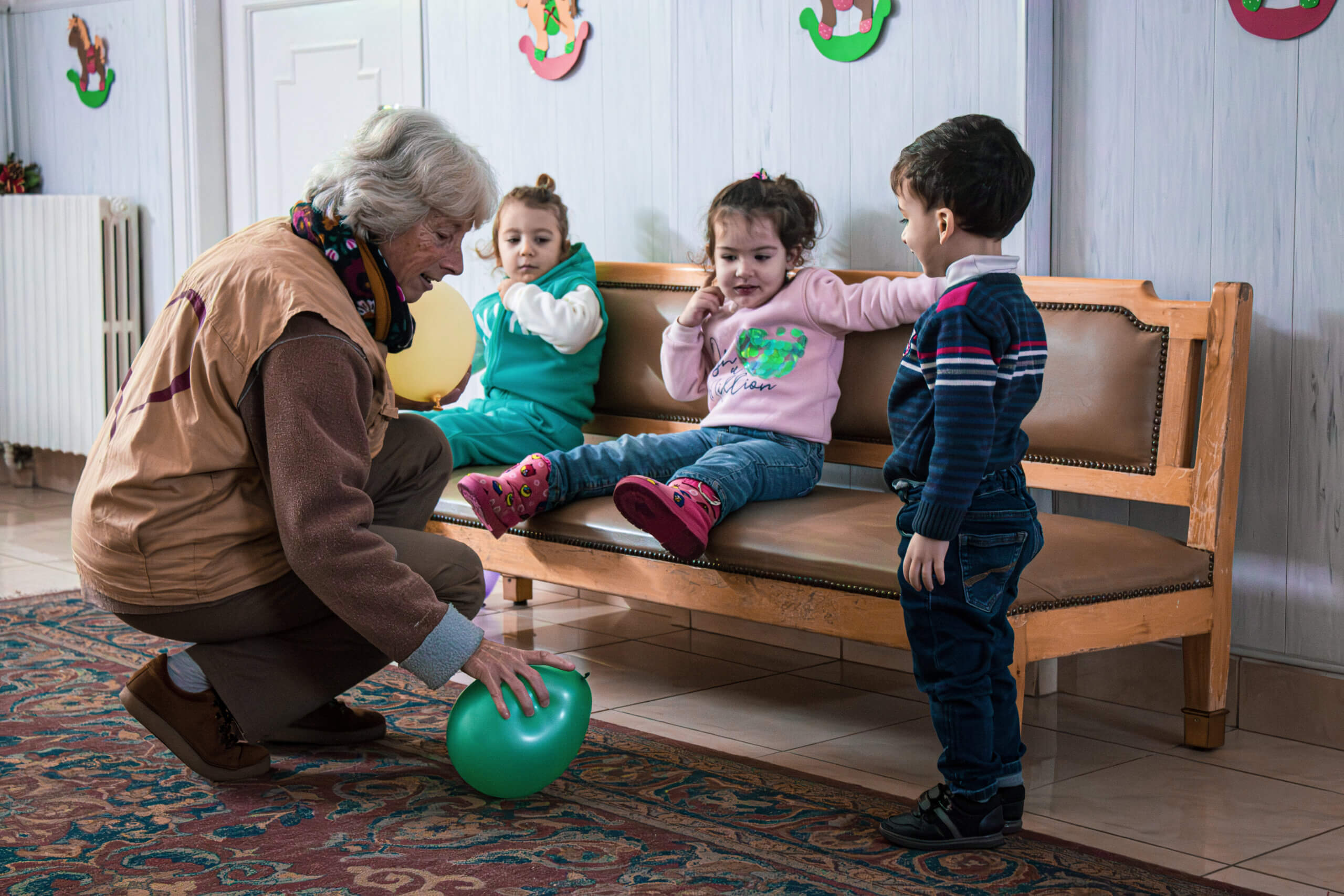
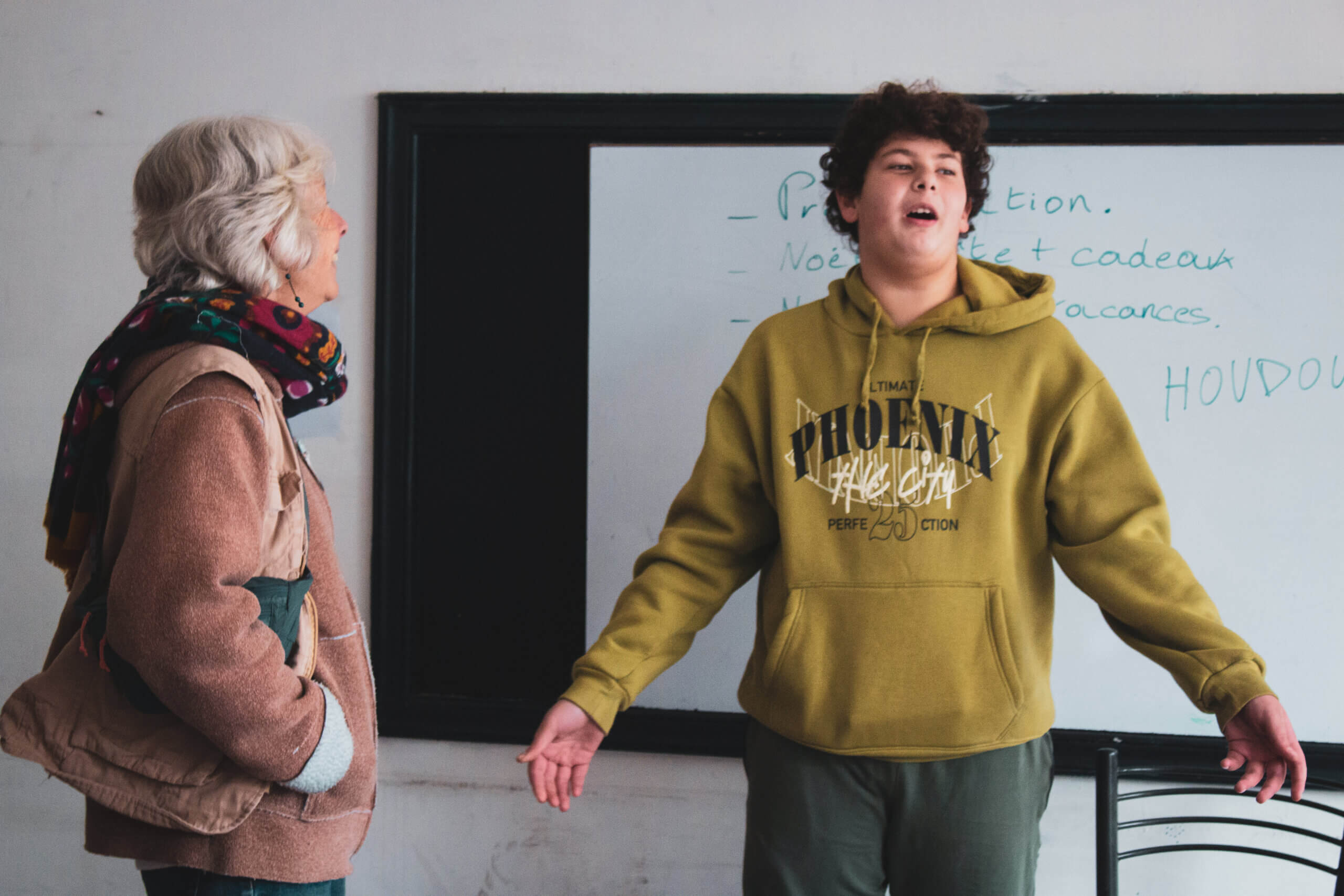
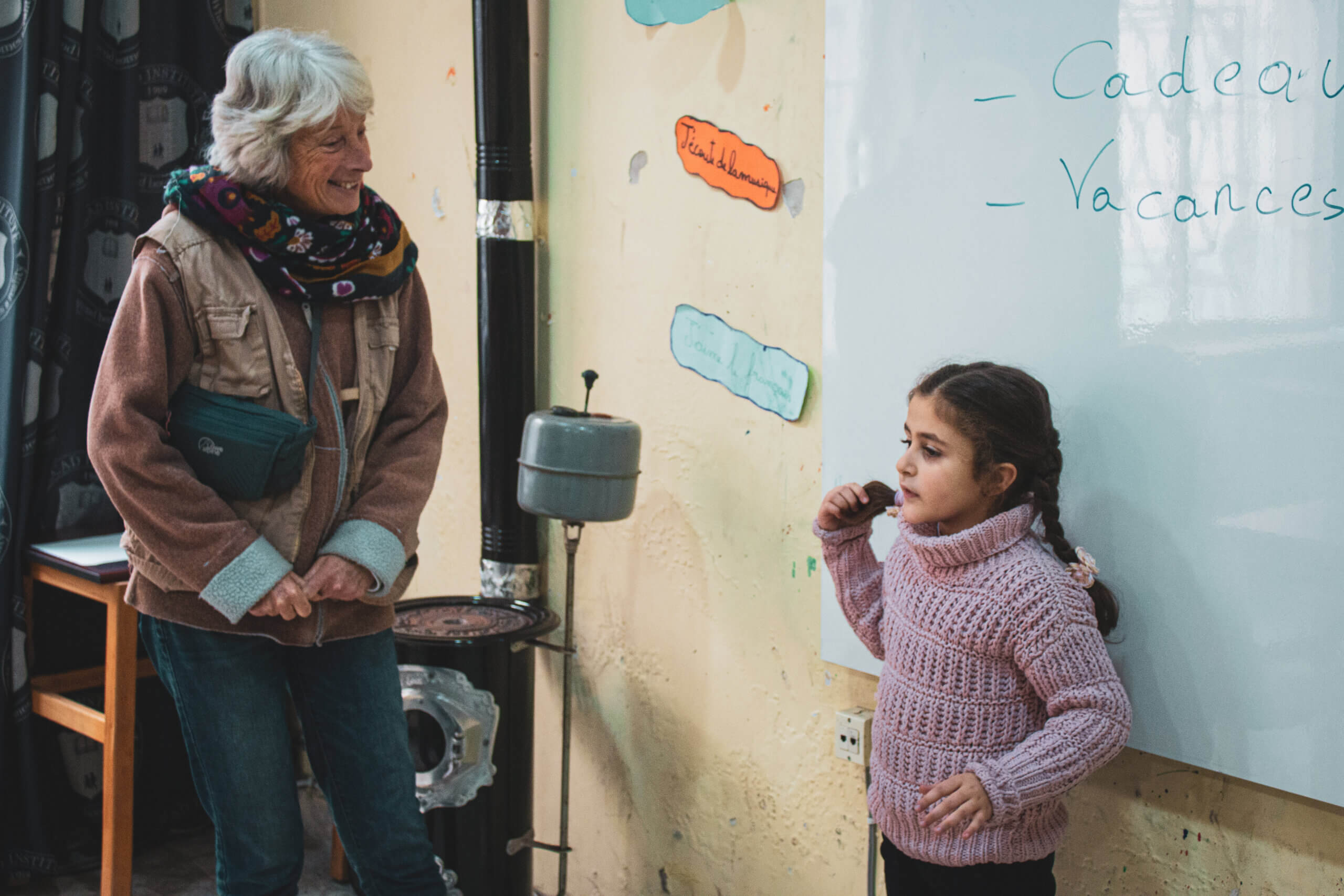
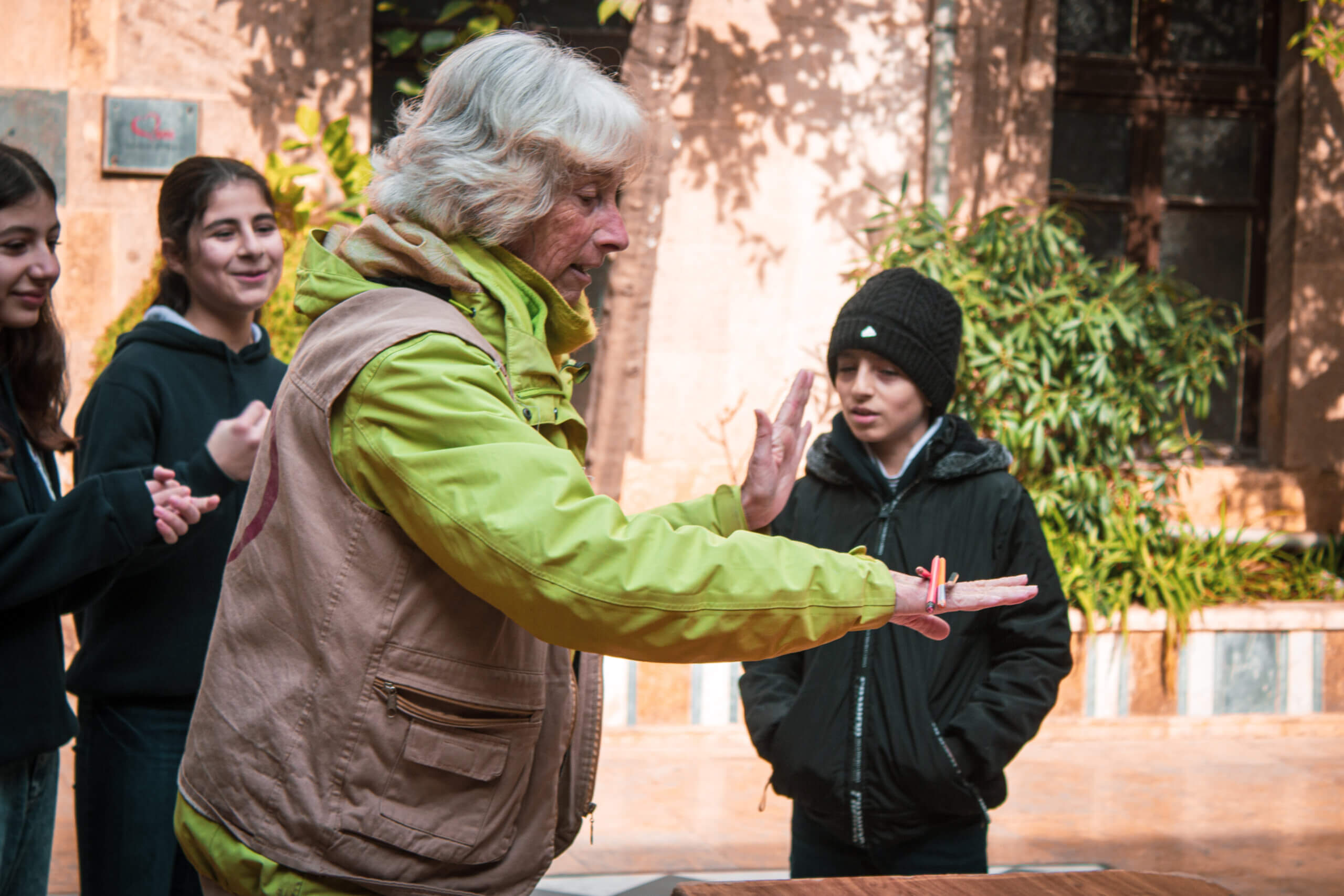
Syria is an age-old Christian land where apostles and saints have left their mark: St. Peter, St. Paul, St. Sergius and St. Bacchus, St. Simeon the stylist, St. Thecla, St. Elijah…
It is also a country with a rich history, having been occupied by Romans, Byzantines, Arabs and the Crusaders, and it still has a rich cultural heritage today.
The cultural visits we were lucky enough to make were always linked to this past, such as Maaloula, a Christian village nestling at the foot of high cliffs where people still speak Aramaic (the language of Christ). A martyred village too, where Islamist fighters destroyed churches and monasteries and murdered residents who refused to recant their Christian faith in September 2013.
At 12pm on Sunday, the bells ring the Angelus and on the cliff top, I’m sitting behind the tall statue of the Virgin who protects Maaloula: Fayrouz’s crystal voice resonates and my soul soars.
Seeing Palmyra again was a dream I hadn’t dared to imagine during my mission: It was impressive to set foot once again on this archaeological site, listed as a UNESCO World Heritage Site in 1980 (one of the most emblematic in Syria) and, above all, listed as an endangered site since 2013 following the destruction committed by ISIS.
Wandering among the temple of Bâal ruins, skirting the prestigious colonnade, contemplating the vastness of the site from the terraces of the theatre can only humble us in the face of the richness and grandeur of past eras, the wisdom of successive rulers including the mythical Queen Zenobia, and the importance of the legacy of history for humanity.
The old churches of Tartous also bear witness to the ancestral presence of Christians in this land: The one turned into a museum now dates from 1105 AD (in which a miraculous icon attributed to St. Luke is said to have been found), and which, over the course of occupations, was a mosque and then a defensive fortress.
The old cathedral, including part of the nave of the chapter house, has stood the test of time in the foundations of the old town, despite the motley assortment of dwellings that have sprung up along its walls.
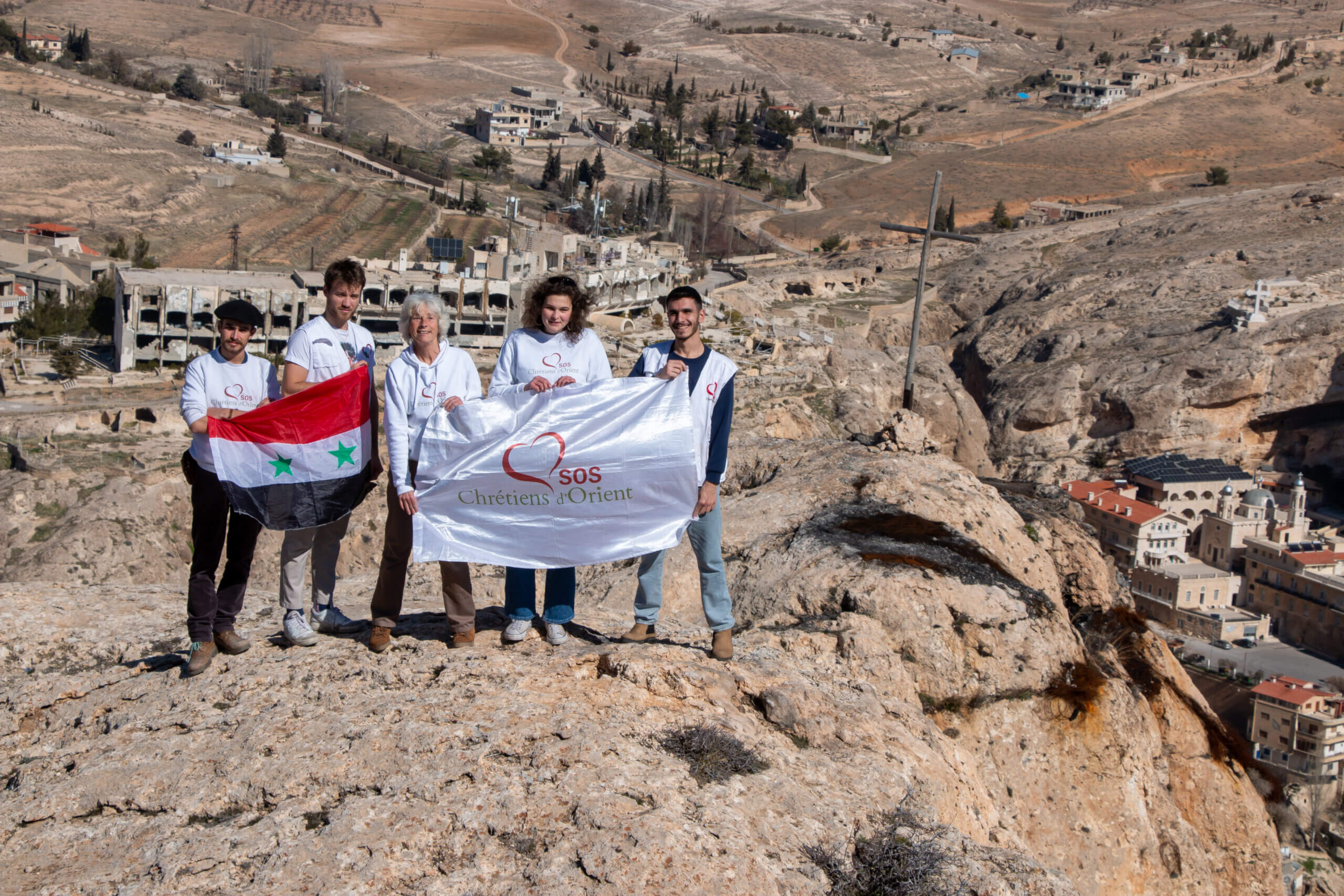
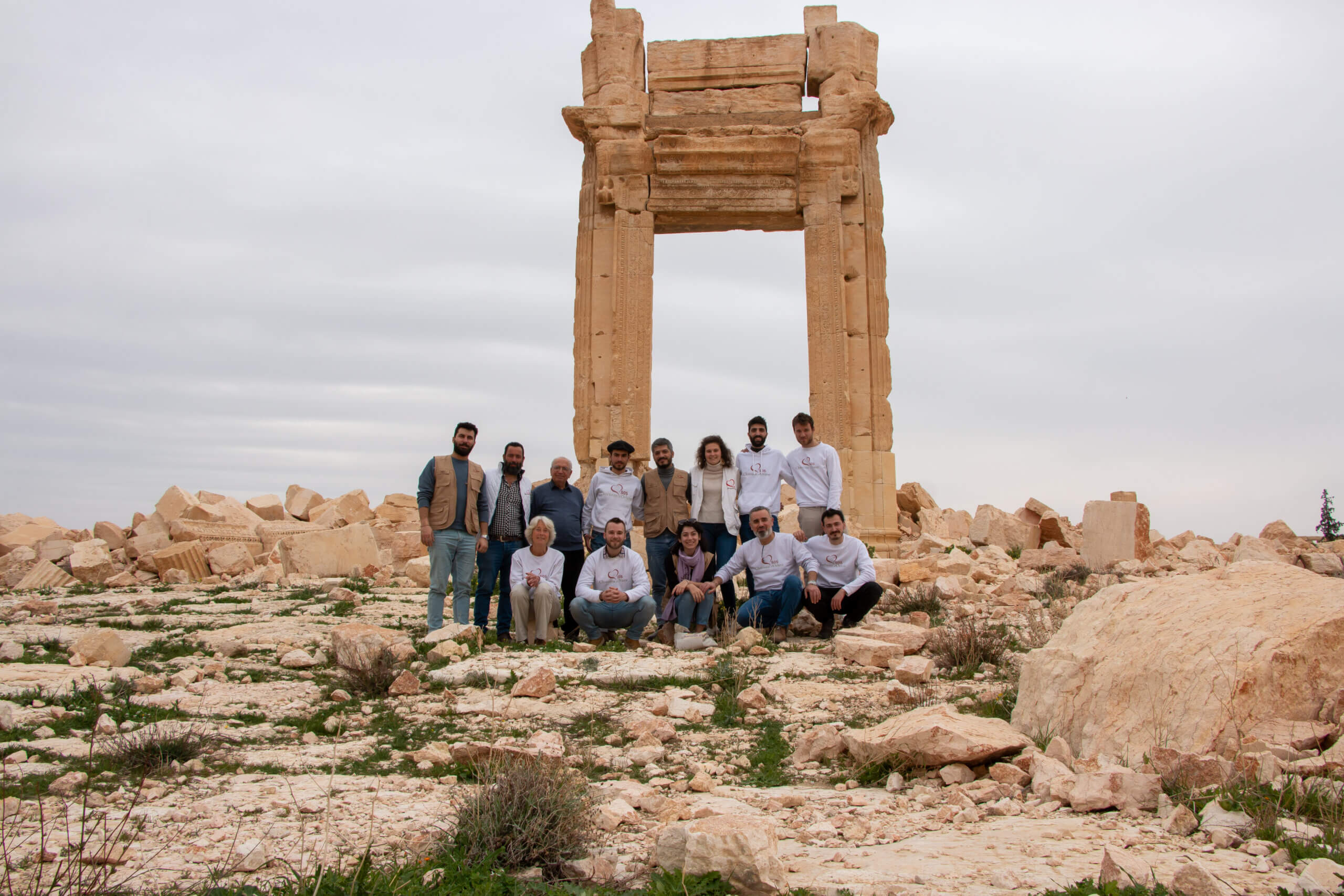
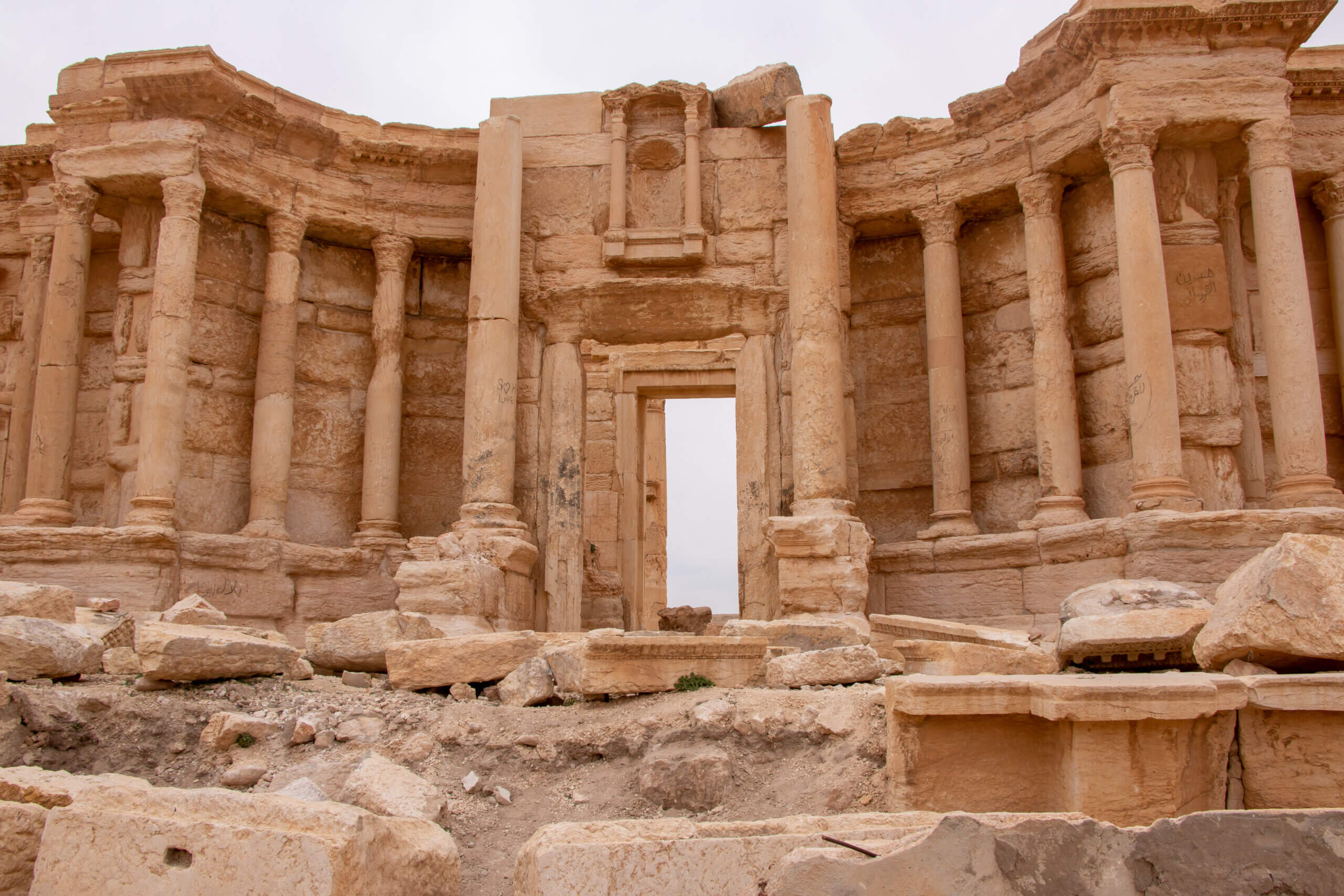
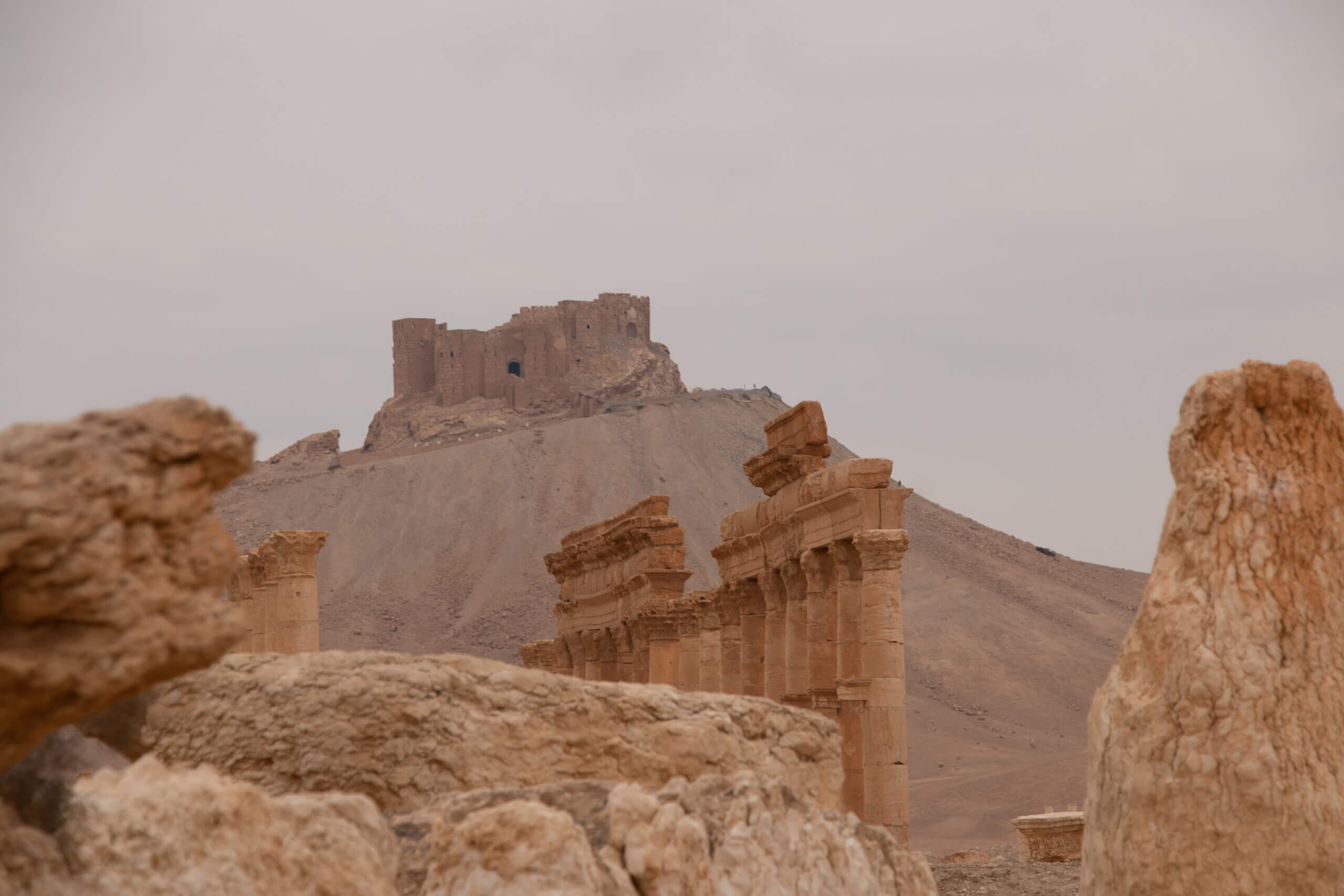
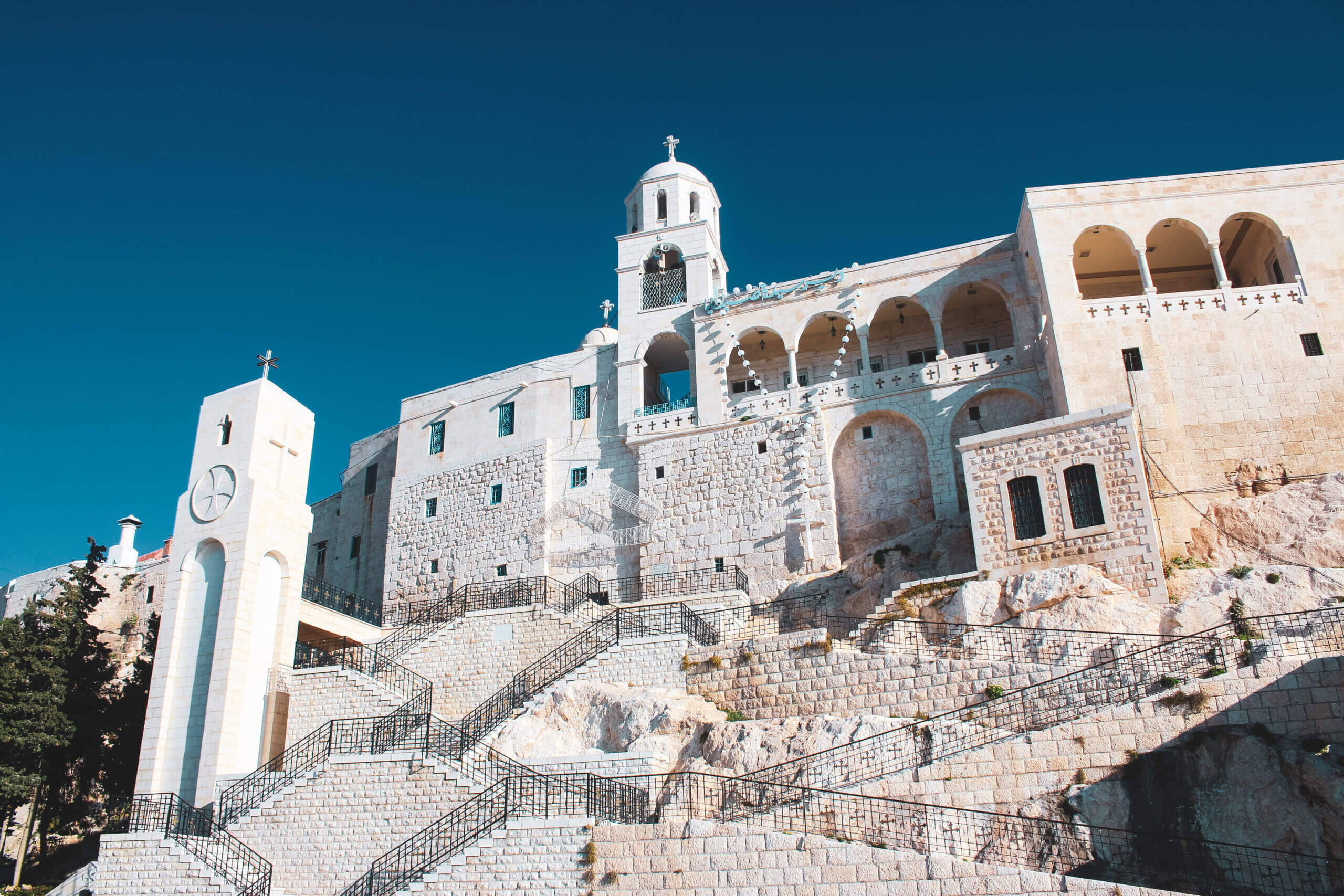
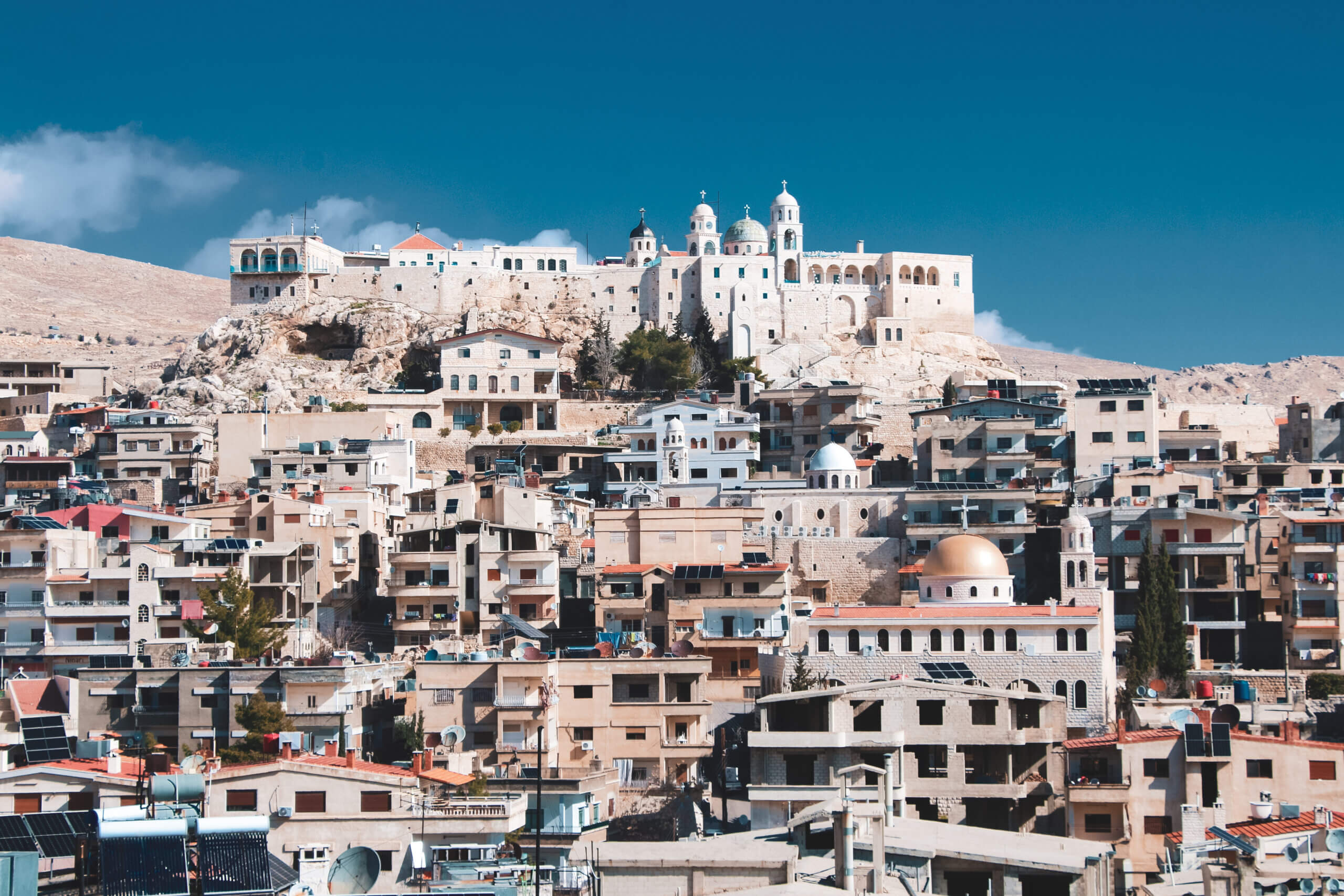
Having spent 3 months on assignment in Aleppo, I was also lucky enough to see progress being made in rehabilitating the souks thanks to the Aga Khan Foundation, and to visit the imposing citadel which has been reopened to the public after repairing the damage caused by the earthquake.
Aleppo’s neighbourhoods are full of contrasts. In the east, where it was occupied by the jihadists during the civil war, there has been widespread destruction. In the west and centre, the destruction has been targeted: Churches, the old Christian quarter of Jdeideh, houses and buildings on the front line. I was happy to contribute, thanks to SOS Chrétiens d’Orient, to the restoration of a flat in the Armenian quarter of Midan, which was badly hit by the earthquake.
I will keep Vivi, Alfred, Tata Marie, Norma in my thoughts and prayers for a long time, as well as Rita, Katia, Lea, Joelle, Aline, Roba, Alexander, Mecho, Edmond, Marco, Marcel, Brother Harout, Sister Pascale, Sister Marie-Claire, Gina, Moussa, Madeleine, Soussou, Juliette, Tante Madeleine, Tante Alla, Judith, Suzanne, Mona, Rhamez, Abou Philippe and so many others… who have given me so much through their expressions of sympathy, and all the Syrian volunteers I’ve met during my donation tours in Aleppo.
My testimony would not be complete without thanking Wael, Jean-Rémi, Jeanne and Antoine and the organization’s staff in Damascus, Homs and Aleppo for their welcome and kindness.
Florence, volunteer in Syria
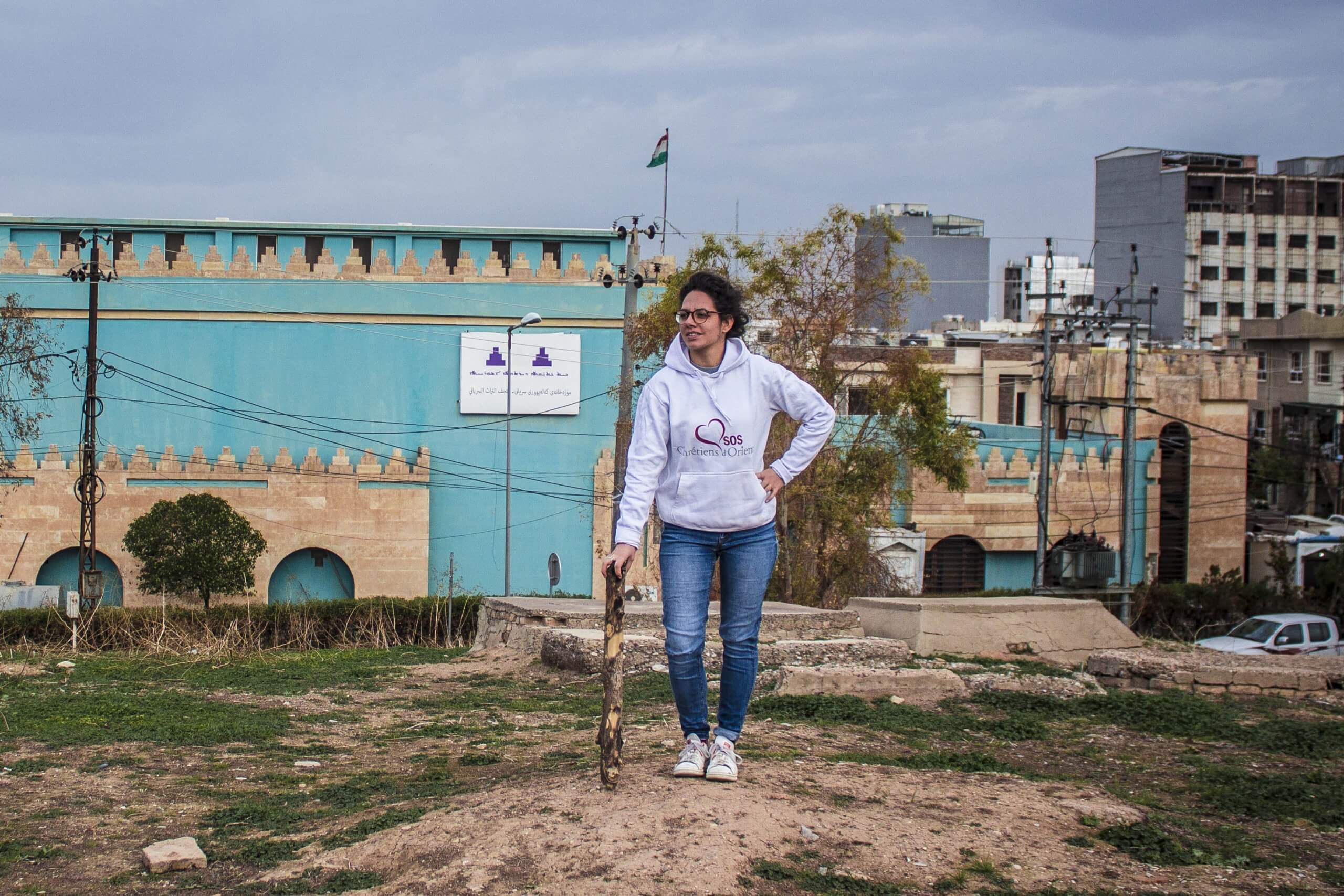
Head of volunteers